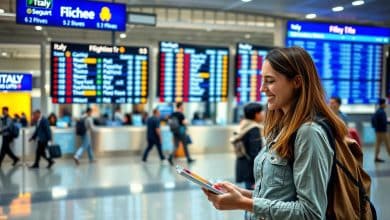Practicing Cultural Sensitivity: Navigating New Destinations Respectfully
Anúncios
Cultural sensitivity is key for respectful travel. It lets people connect deeply with different cultures worldwide. As a global citizen, being aware and respectful makes travel better and builds stronger bonds with local cultures.
By embracing diversity and inclusion, travelers make their trips more rewarding. They also show respect for the communities they visit. This article will show why these practices are important and encourage more thoughtful travel.
Understanding Cultural Sensitivity in Travel
Cultural sensitivity is key when traveling. It helps us connect and learn from others. By respecting different cultures, we build positive relationships on our journeys.
Definition and Importance
Cultural sensitivity means knowing and valuing cultural differences. It’s the base for good communication across cultures. Without it, we might misunderstand each other, which is why it’s so important today.
Key Aspects to Consider
There are a few important things to think about for cultural sensitivity:
- Awareness: Knowing cultural norms helps avoid mistakes.
- Respect: Showing respect for local customs shows we value their way of life.
- Openness to Learning: Learning from different cultures helps us grow and have richer experiences.
By focusing on these, we not only grow personally but also positively impact the places we visit.
The Role of Cultural Awareness
Cultural awareness is key to making meaningful connections while traveling. Knowing local customs and traditions helps travelers connect with people on a deeper level. This connection can make the travel experience better.
Being open to different cultures helps everyone feel respected and valued. It builds a sense of belonging and respect between travelers and locals.
Building Connections
Understanding cultural norms is vital for building trust with locals. Travelers need to be respectful in their interactions. Here are some tips for engaging with locals:
- Active listening skills to truly understand local perspectives.
- Respect for traditions, customs, and social hierarchies.
- Open-mindedness towards different lifestyles and viewpoints.
Following these tips can lead to positive interactions. It makes adapting to new cultures easier. And it can create lasting connections during your travels.
Enhancing Travel Experiences
Traveling with cultural awareness can change your experiences. By diving into local cultures, travelers gain a deeper understanding of the world. Here are some ways to enhance your experiences:
- Exploring local markets to experience the vibrancy of daily life.
- Participating in community events or festivals that reflect regional heritage.
- Taking part in traditional culinary classes to appreciate local cuisine.
Emphasizing cultural competence makes travel more rewarding. It leads to personal growth through enriching interactions. As travelers explore diverse environments, they gain a broader perspective. This enriches their journey.
Researching Destinations Before Travel
Proper research makes any trip better. Knowing a place’s background, customs, and cultural practices helps you interact respectfully. This knowledge helps you avoid unintentional mistakes. Here, we’ll talk about why background knowledge is key and suggest ways to learn more.
Importance of Background Knowledge
Getting to know a place before you go is crucial. Here’s why:
- Respect local customs by knowing what’s right and wrong.
- Build meaningful connections with locals by talking about things you both know.
- Avoid cultural faux pas that could make things awkward or uncomfortable.
Resources for Learning
There are many ways to learn about different cultures. Using these resources can make your trip even better:
- Travel guides like Lonely Planet and Fodors give deep insights into local ways and etiquette.
- Online platforms like TripAdvisor and Reddit have forums for sharing tips and stories.
- Diversity training programs and workshops teach you how to navigate different cultures.
- Documentaries and cultural films give you a visual understanding that deepens your appreciation.
Observing Local Customs and Traditions
Understanding and observing local customs are key for connecting with a new culture. Respecting traditions builds goodwill and makes travel more rewarding. It’s important to know some essential practices when exploring different cultures.
Essential Practices to Follow
Travelers who dive into local customs can form strong bonds with the community. Important practices include:
- Dress codes: Wearing the right clothes, especially in sacred places, shows respect.
- Dining etiquette: Following local dining rules, like using specific utensils, makes meals more welcoming.
- Non-verbal communication: Knowing different gestures and body language is crucial.
The Value of Participation
Joining in local events or traditions offers great benefits. Being part of cultural activities lets travelers dive deep into a place’s heritage. It leads to:
- Deeper understanding of community values.
- Chances to make lasting connections with locals.
- Real experiences that change how you see travel.
By observing customs and participating in cultural activities, travelers show respect and make unforgettable connections. These experiences enrich their travels.
Respecting Language Differences
Language differences can be a challenge for travelers. But, they are key to better cross-cultural communication. Learning basic phrases for travel helps in daily interactions and shows respect for local culture. Even a little knowledge of the local language can make your trip more meaningful.
Basic Phrases to Know
Knowing a few key phrases can really help you talk to locals. Here are some basic phrases every traveler should learn:
- Hello – A simple greeting opens doors.
- Thank you – Expressing gratitude fosters goodwill.
- Please – Politeness goes a long way in any language.
- Excuse me – Important for gaining attention or navigating through crowds.
- Do you speak English? – Helps in assessing communication possibilities.
The Impact of Language on Interactions
Being able to speak even basic phrases makes interactions more respectful. Studies show that language shapes how we see things and builds rapport. When travelers try to speak the local language, locals often respond with more warmth and hospitality.
Misunderstandings can happen because of language differences. But, trying to communicate well can solve these problems. Embracing these language differences makes your trip better and shows you value the culture you’re experiencing.
Engaging with Local Communities
Travelers looking to make their trips more meaningful often choose to engage with local communities. One great way to do this is by volunteering while traveling. This allows them to help out in local projects and learn more about the culture and daily life of the people they meet.
Volunteering Opportunities
Many groups help tourists volunteer in different places. They work on projects like saving the environment, helping with education, and improving health services. This way, both the traveler and the local community gain something valuable. Some examples of volunteer work include:
- Animal rescue and rehabilitation programs
- Community development projects
- Teaching English or other skills
- Agricultural assistance in local farms
Encouraging Sustainable Tourism
Volunteering helps support sustainable tourism. It helps protect cultural sites and keeps local traditions alive. By volunteering, travelers show they care about the environment and the people they meet. This approach makes travel more rewarding and promotes responsible behavior for everyone involved.
Adapting Travel Behavior
When exploring different cultures, adapting your travel behavior is key. Being mindful in your travels enriches your experiences and shows respect for local traditions. One important part is dressing appropriately, which changes a lot depending on the place. Knowing how to dress right shows you care about local customs.
Dressing Appropriately
Dressing right often shows cultural importance. For example:
- In many Middle Eastern countries, you should wear modest clothes that cover your arms and legs.
- In Buddhist temples, wear clothes that are respectful and cover your shoulders and knees.
- In hot places, wear light clothes, but still keep them decent.
It’s smart to research what locals wear to fit in. This small act of thoughtfulness can make your trip better and improve your interactions with locals.
Mindfulness in Social Settings
Being mindful in social situations can really change your travel experience. Pay attention to how you act and what’s around you to respect locals. Simple steps include:
- Being mindful of noise, especially in quiet or sacred areas.
- Learning about local greetings and gestures.
- Steering clear of personal questions that might be seen as too much.
By doing these things, you help create a positive vibe and connect with different communities. Travel is not just about seeing new places. It’s about making connections through thoughtful interactions.
Learning from Cultural Sensitivity Mistakes
Traveling often gives us chances to learn from our mistakes. Meeting different cultures can lead to misunderstandings. But, these experiences help us grow in cultural understanding.
Being open to feedback while traveling is key. It helps us navigate diverse places with care.
Accepting Feedback Gracefully
Getting feedback on cultural mistakes is important. It helps us see how we might have unintentionally upset someone. By listening to feedback, we show respect and open up to meaningful talks.
Embracing feedback is a big step towards understanding different cultures better.
Turning Mistakes into Learning Opportunities
Mistakes can teach us a lot and make us appreciate other cultures more. We might accidentally misuse local customs or ignore important social rules. Thinking about these mistakes helps us improve our cultural awareness.
Here are some ways to learn from mistakes:
- Listen well to what locals say and change how we act.
- Talk with locals about their culture to learn more about their values.
- Look for educational resources or workshops on culture.
By doing this, every interaction becomes a chance to grow. Accepting mistakes helps us understand different cultures better and makes our travels more rewarding.
The Impact of Cultural Sensitivity on Global Travel
Cultural sensitivity is key in making travel better for everyone. It helps travelers show respect for different cultures. This leads to deeper connections and more meaningful experiences.
When we travel with an open mind and respect for local customs, we gain a lot. We not only enrich our own experiences but also honor the cultures we meet.
Fostering Mutual Respect
Embracing cultural sensitivity builds respect among people from various backgrounds. Showing appreciation for local traditions can create real connections. These interactions help break down stereotypes and foster harmony.
This respect has a big impact. It changes how communities view foreign visitors. It also makes the environment better through positive exchanges.
Promoting Global Citizenship
Travel helps us see ourselves as part of a global community. It teaches us to be empathetic and connected. This is crucial for a better society.
Traveling with cultural sensitivity promotes a mindset of collaboration and global unity. It makes our shared human experience richer.
FAQ
What is cultural sensitivity in travel?
Why is cultural awareness important for travelers?
How can one research a destination’s cultural practices before traveling?
What are some essential practices to follow when observing local customs?
How can travelers respect language differences?
What opportunities exist for engaging with local communities while traveling?
How should travelers adapt their behavior in different cultural contexts?
What should travelers do if they make a cultural mistake?
What is the significance of cultural sensitivity on a global scale?
Published on: 5 de February de 2025

Luke Martin
Luke Martin, author of Credwallets.com, is a mathematics graduate with a specialization in financial markets. Known for his love of pets and his passion for sharing knowledge, Luke created the site to provide valuable insights into the complexities of the financial world. His approachable style and dedication to helping others make informed financial decisions make his work accessible to all, whether they're new to finance or seasoned investors.







